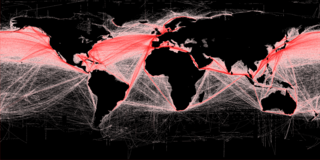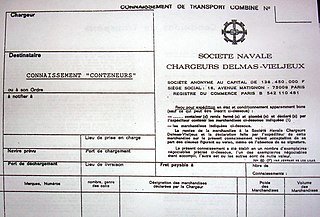
Freight transport, also referred as freight forwarding, is the physical process of transporting commodities and merchandise goods and cargo. The term shipping originally referred to transport by sea but in American English, it has been extended to refer to transport by land or air as well. "Logistics", a term borrowed from the military environment, is also used in the same sense.
The Incoterms or International Commercial Terms are a series of pre-defined commercial terms published by the International Chamber of Commerce (ICC) relating to international commercial law. Incoterms define the responsibilities of exporters and importers in the arrangement of shipments and the transfer of liability involved at various stages of the transaction. They are widely used in international commercial transactions or procurement processes and their use is encouraged by trade councils, courts and international lawyers. A series of three-letter trade terms related to common contractual sales practices, the Incoterms rules are intended primarily to clearly communicate the tasks, costs, and risks associated with the global or international transportation and delivery of goods. Incoterms inform sales contracts defining respective obligations, costs, and risks involved in the delivery of goods from the seller to the buyer, but they do not themselves conclude a contract, determine the price payable, currency or credit terms, govern contract law or define where title to goods transfers.

Cargo consists of goods conveyed by water, air, or land. In economics, freight is cargo that is transported at a freight rate for commercial gain. Cargo was originally a shipload but now covers all types of freight, including transport by rail, van, truck, or intermodal container. The term cargo is also used in case of goods in the cold-chain, because the perishable inventory is always in transit towards a final end-use, even when it is held in cold storage or other similar climate-controlled facilities. The term freight is commonly used to describe the movements of flows of goods being transported by any mode of transportation.

FOB is a term in international commercial law specifying at what point respective obligations, costs, and risk involved in the delivery of goods shift from the seller to the buyer under the Incoterms standard published by the International Chamber of Commerce. FOB is only used in non-containerized sea freight or inland waterway transport. As with all Incoterms, FOB does not define the point at which ownership of the goods is transferred.

A cargo ship or freighter is a merchant ship that carries cargo, goods, and materials from one port to another. Thousands of cargo carriers ply the world's seas and oceans each year, handling the bulk of international trade. Cargo ships are usually specially designed for the task, often being equipped with cranes and other mechanisms to load and unload, and come in all sizes. Today, they are almost always built of welded steel, and with some exceptions generally have a life expectancy of 25 to 30 years before being scrapped.

A boat or ship engaged in the tramp trade is one which does not have a fixed schedule, itinerary nor published ports of call, and trades on the spot market as opposed to freight liners. A steamship engaged in the tramp trade is sometimes called a tramp steamer; similar terms, such as tramp freighter and tramper, are also used. Chartering is done chiefly on London, New York, and Singapore shipbroking exchanges. The Baltic Exchange serves as a type of stock market index for the trade.
Shipbroking is a financial service, which forms part of the global shipping industry. Shipbrokers are specialist intermediaries/negotiators between shipowners and charterers who use ships to transport cargo, or between buyers and sellers of vessels.
A freight rate is a price at which a certain cargo is delivered from one point to another. The price depends on the form of the cargo, the mode of transport, the weight of the cargo, and the distance to the delivery destination. Many shipping services, especially air carriers, use dimensional weight for calculating the price, which takes into account both weight and volume of the cargo.

A freight forwarder, or forwarding agent, is a person or a company who, for a fee, organizes shipments for the shipper by liaising with carriers. A forwarder does not move the goods but acts as an agent in the logistics network.

Freight companies are companies that specialize in the moving of freight, or cargo, from one place to another. These companies are divided into several variant sections. For example, international freight forwarders ship goods internationally from country to country, and domestic freight forwarders, ship goods within a single country.
The Automated Export System (AES) is the system used by U.S. exporters to electronically declare their international exports, known as Electronic Export Information (EEI), to the Census Bureau to help compile U.S. export and trade statistics. This information is also shared with the Bureau of Industry and Security, the Directorate of Defense Trade Controls, and other federal agencies involved in monitoring and validating U.S. exports. Formerly this declaration was only made on paper on the Shipper's Export Declaration form.
A charterparty is a maritime contract between a shipowner and a "charterer" for the hire of either a ship for the carriage of passengers or cargo, or a yacht for leisure.
Custom brokers or Customs House Brokerages are working positions that may be employed by or affiliated with freight forwarders, independent businesses, or shipping lines, importers, exporters, trade authorities, and customs brokerage firms.
An air waybill (AWB) or air consignment note is a receipt issued by an international airline for goods and an evidence of the contract of carriage. It is not a document of title to the goods. The air waybill is non-negotiable.
Sector Commander is the position title of the commanding officer of a United States Coast Guard Sector, usually of the rank of Captain (O-6). The Sector Commander's second-in-command is the Deputy Sector Commander. Also reporting directly to the Sector Commander are the Command Master Chief (CMC), the Senior Reserve Officer, and the Sector's Auxiliary Coordinator.
Affreightment is a legal term relating to shipping.

A bill of lading is a document issued by a carrier to acknowledge receipt of cargo for shipment. Although the term historically related only to carriage by sea, a bill of lading may today be used for any type of carriage of goods. Bills of lading are one of three crucial documents used in international trade to ensure that exporters receive payment and importers receive the merchandise. The other two documents are a policy of insurance and an invoice. Whereas a bill of lading is negotiable, both a policy and an invoice are assignable. In international trade outside the United States, bills of lading are distinct from waybills in that the latter are not transferable and do not confer title. Nevertheless, the UK Carriage of Goods by Sea Act 1992 grants "all rights of suit under the contract of carriage" to the lawful holder of a bill of lading, or to the consignee under a sea waybill or a ship's delivery order.
A manifest, customs manifest or cargo document is a document listing the cargo, passengers, and crew of a ship, aircraft, or vehicle, for the use of customs and other officials. Where such a list is limited to identifying passengers, it is a passenger manifest or passenger list or bag manifest; conversely, a list limited to identifying cargo is a cargo manifest or cargo list, or a container manifest for cargo in a container. The manifest may be used by people having an interest in the transport to ensure that passengers and cargo listed as having been placed on board the transport at the beginning of its passage continue to be on board when it arrives at its destination.
This document, made up generally by the ship's broker, from the contents of the bills of lading, contains a specification of the nature and quantity of the cargo laden, and is generally attested officially, and in some countries notarially. The prize laws seldom mention this paper; nor is it general; but yet of essential importance in case of search, as well for belligerents, as for neutrals in procuring a speedy dismissal. It is usual to require it at the custom house. (p301)

The Kanoo Group is a large family-owned by conglomerate based in the UAE and Oman. It is a part of the parent company Yusuf Bin Ahmed Kanoo Group, founded in Bahrain by Haji Yusuf Bin Ahmed Kanoo which started from a trading and shipping enterprise. From Bahrain, the business spread to Saudi Arabia in the 1930s.
Protecting agent or protective agent or supervisory agent in shipping is the person or entity that provide shipping agency services to the shipowners, charterers, time charterers in the situations where the conflict of interests exists or anticipated from the shipping agent. The main task of the protecting agent is to protect the interest of his principal during the port call for which the shipping agent have been nominated or appointed by the party whose interest does not concur with those of the principal.








